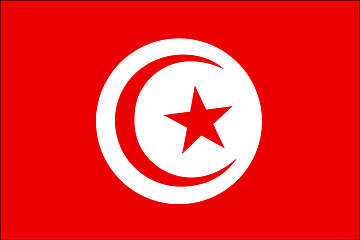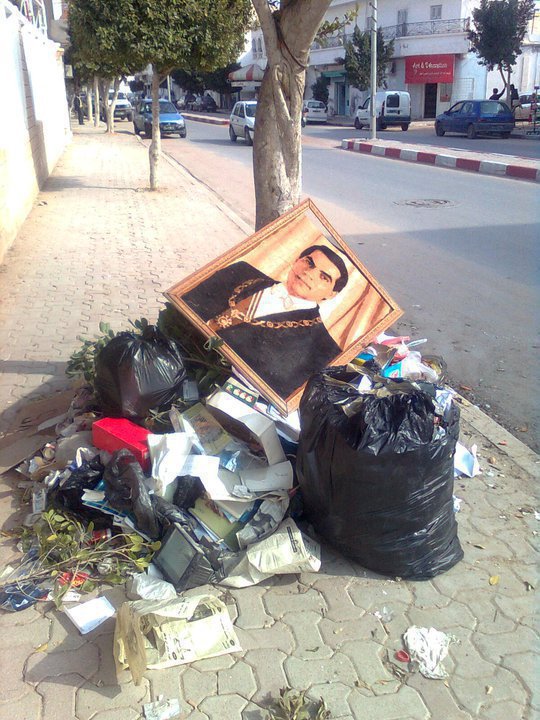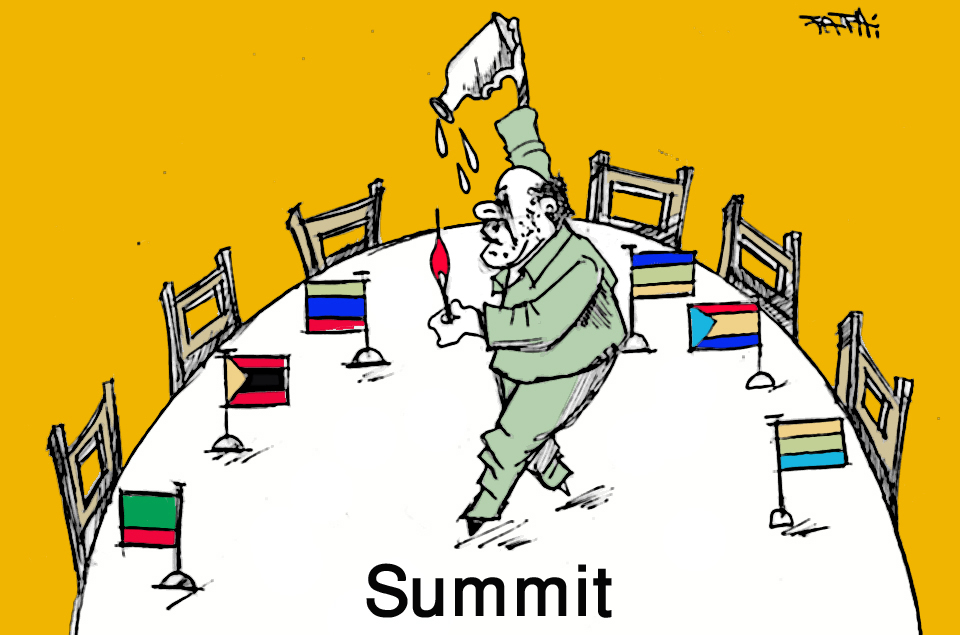 2135 GMT: Elaph reports that about 50 people are continuing a sit-in protest on Habib Bourguiba Avenue in Tunis, breaking the 8 p.m. curfew.
2135 GMT: Elaph reports that about 50 people are continuing a sit-in protest on Habib Bourguiba Avenue in Tunis, breaking the 8 p.m. curfew.
2105 GMT: President Fuad Mbazaa, addressing the nation on television, promised "a complete break with the past" with a "revolution of dignity and freedom" honouring "all the legitimate aspirations of the uprising".
Mbazaa's address followed the first meeting of the Cabinet, which proceeded despite reports that it would be delayed until Thursday.
2050 GMT: The Democratic Forum for Work and Liberty, after a meeting of the leadership, has confirmed that the withdrawal of its head Mustafa Ben Jaafar as Minister of Health is "final".
A spokesman said,"We have decided to withdraw from the current government and non-participation....[The party will] call to start new negotiations to form a new government."
Jaafar had resigned, in what the party called a "suspension" of participation, as a minister on Tuesday.
2045 GMT: Al Arabiya reports that 1800 political prisoners have been released in Tunisia.
1945 GMT: Tunisian TV says 33 members of deposed President Ben Ali's family arrested. It is showing seized gold, jewelry, credit cards, and property confiscated from old regime figures.
1715 GMT: Earlier today we reported the comments of Mohamed ElBaradei, the head of Egypt's National Association for Change, warning of a "Tunisian-style revolt". In that interview, ElBaradei rejected street protests and advocated reform within the system.
However, ElBaradei has now posted on Twitter, "Fully support call for peaceful demonstrations vs. repression and corruption. When our demands for change fall on deaf ears what options remain?"
1710 GMT: Minister of Regional Development Najid Chebbi said that Tunisia has freed all remaining political prisoners, including members of the banned al-Nahda Party.
1620 GMT: Earlier today (1030 GMT) we wrote about the case of journalist Fahem Boukadous, jailed in July 2010 and sentenced to four years for covering labour protests in the Gafsa mining region.
News is now circulating that Boukadous has been freed.
1610 GMT: Hazim Abdel-Fattah, 35, an employee of a state water firm, tried self-immolation in front of the Governor's office in central Cairo today.
Abdel-Fattah doused himself in fuel but people stopped him from setting himself alight.
This is the fourth case of attempted suicide by fire in the last three days in Egypt.
1525 GMT: AFP is reporting two more cases of self-immolation in Algeria today.
In fact, one of them may have occurred yesterday (see updates), a woman --- reported as "about 40" in one source, in "her fifties" in another --- became the first female to attempt suicide by fire. She was only slightly wounded.
A 35-year-old man is in critical condition after setting himself alight today in Dellys, near Algiers.
There are now eight cases (some sources say seven) of self-immolation in Algeria in the last week.
1515 GMT: Angelique Christafis of The Guardian of London reports, "Real change: peaceful protestors chant 'RCD out'. No teargas. Police letting them demonstrate."
1500 GMT: Peter Beaumont of The Observer of London writes: "In Tunis. Mood good-natured in city centre. Someone's put flowers on the tank at one end of Avenue Habib Bourguiba. Demo at other but no [tear] gas."
1450 GMT: Algerian Minister of Trade Moustafa Benbad offers reassurances today:
The situation in Algeria is not similar to Tunisia. What happened in Tunisia is the consequence of things which accumulated for years. In Algeria, freedom of expression is guaranteed; the press can criticize officials even more severely than in some European countries. The access to internet and to the information sources is also guaranteed. It was not the case in Tunisia.
1400 GMT: Tunisian prosecutors have opened an investigation into the foreign assets of deposed President Ben Ali and his family.
1320 GMT: Le Figaro carries the report, which circulated as chatter yesterday, that the older sister of former President Ben Ali has died of a heart attack.
Naima Ben Ali passed away in a hospital in Sousse in eastern Tunisia.
1315 GMT: In Yemen, hundreds of protesters have chanted anti-government slogans at Sanaa University in the capital.
Police fired warning shots to disperse the demonstrators. No injuries were reported. Several students were arrested but, according to a security official, soon released.
Protesters chanted, "Revolution, revolution, people against the frightened leader", "Liberty's Tunisia, Sanaa salutes you a thousand times," and "Toppling the corrupt (leader) is a duty."
1310 GMT: Jeune Afrique celebrates the dismissal of Judge Mehrez Hammami as the removal of an advocate for the Ben Ali regime.
1305 GMT: Reuters reports that Switzerland is freezing the assets of deposed Tunisian President Ben Ali.
1250 GMT: In an article in The New York Times featuring comments from Tunisians about the final days of the Ben Ali regime, some stand-out moments....
For example, there is the episode at the state-run paper La Presse.
Inspired by the new climate, [journalists] revolted and dismissed their boss, Gawhar Chatty, and set up their own interim committee to run the paper.When Chatty showed up at the office Monday after a call advising him to stay home, cartoonist Lotfi [Ben Sassi] marched into his office for the final farewell.
"We informed him (by phone) that we're taking charge of the paper and if he comes in we'll break his face, excuse the expression," managing editor Faouzie Mezzi told AP Television News.
Despite the fall of the Ben Ali regime, for some there is still fear: "We made a revolution in a month and in six days we can't all demonstrate," said a woman calling herself only Malika.
For some, there is joy verging on wonder and thoughts on the sudden changes that ended the 23-year reign of Ben Ali.
"We don't believe this," said Saida Ferjani, 56, chatting Tuesday at a table in a sidewalk cafe about politics — impossible under Ben Ali's reign. "We think it's a movie. We feel like we're dreaming .... Before, when we talked, it was quietly at home. We were afraid to express ourselves."Ferjani, like many others, credits online media and social networks for breaking the barrier of silence. "It's thanks to the Internet and Facebook that we could topple this government. It's the young who did it," she said.
(Evgeny Morozov, again displaying his knowledge of events in Tunisia and respect for those who are there, responds, "I assume she means the DMs [direct messages] that Tunisian generals exchanged on Twitter and Facebook.")
Tunisia Analysis: Will the New Government Survive?
Tunisia Video: Claimed Footage of Tuesday Protests
Tunisia and the Real Net Effect: How Facebookers Changed Politics and Newsrooms
Tunisia (and Beyond) Tuesday LiveBlog: Watching the Regimes
1145 GMT: AFP reports on this morning's protests in Tunis....
Demonstrators chanted, "Parliament and a new Constitution", "Revolution against the remnants of Ben Ali", "Minister of Finance [Ridha Chalghoum], Friend of Tripoli", "Ben Ali's party, go", and "Victims of police participated in the revolution" before singing the national anthem.
Security forces prevented the rally from walking along Habib Bourguiba Avenue toward the Ministry of the Interior. Police Colonel Najm al-Din Ziguli said, "Instructions have been given not to confront the protesters and not to fire tear gas. They can protest in front of the Democratic Progressive Assembly without passing near the Ministry of the Interior."
1140 GMT: Picture of the Day?

1115 GMT: At the Arab Economic Summit, the Secretary-General of the Arab League, Amr Moussa, told delegates, "Tunisia's revolution not far from the rest of us".
Not so for Egyptian President Hosni Mubarak, apparently. He did not refer to Tunisia once in his remarks.
1110 GMT: CNN's Wedeman continues, "Bigger demo today than yesterday but police behaving (so far)."
1050 GMT: Ben Wedeman of CNN writes that demonstrators are back on the main avenue in Tunis, "Big protest brewing in Habib Bourguiba but so far its peaceful." The current estimate is 700 to 800 demonstrators.
1045 GMT: Cartoon of Day. Fathi Abul Ezz, drawing for Ahram Online, puts today's Arab Economic Summit in the context of current events:

1030 GMT: The Committee to Protect Journalists has again called for the release of Fahem Boukadous, a television reporter imprisoned in July 2010.
Boukadous is serving a four-year sentence for "belonging to a criminal association" and spreading materials "likely to harm public order" after he covered labour protests in the Gafsa mining region.1025 GMT: Earlier this morning, we closed our analysis of the Tunisian Government's position with an observation on prominent blogger and Minister of Youth and Sport Slim Amamou: "[He] said he would resign when he decided, not when others did. But that only brought further - questions. What should he decide?"
Well, Amamou has given an immediate answer to the BBC World Service: "This is a temporary government in special conditions. The purpose is to set up elections as soon as possible. We are not the real government, we are not here to govern for a long time. It's for the good of the country just to pass this period."
He assured, "I'm free to say whatever I want, and to report what's going on in government."
1020 GMT: Before he suddenly left the Arab Economic Summit in Egypt, Tunisian Foreign Minister Kamel Morjane told reporters, "The Tunisian people have had their say and won in this popular uprising. We would like to confirm this is a transitional government and its goal is clear and its term is limited by law and by agreement between all parties."
Morjane assured, "[The government's] goal is to set up free presidential elections with integrity....that will have foreign monitors or observers....There will be political reforms but also (reforms for) what we wished socially."
1005 GMT: Egyptian opposition leaders have echoed the comments of Mohamed ElBaradei (see 0935 GMT) about a "Tunisian-style revolt" being possible in Egypt. Ayman Nour, the head of the Al-Ghad Party, said:
What happened in Tunisia is very inspiring. The Tunisian model is very similar to its Egyptian counterpart, and the extreme happiness in the Egyptian streets for what happened [in Tunisia] indicates that Egypt might witness solutions like the Tunisian one soon.
“The Tunisian revolution is an earthquake [and] its aftermath will reach neighboring countries — especially Egypt — where aspirations for change have [existed] for a long time now,” said Abdel Halim Qandil, the general coordinator for the Kefaya Movement. He added, “We need to stop seeking fake heroes and descend [on] the streets."
Hamdeen Sabahi, the founder of Al-Karama Party, commented:
The conditions in Egypt are worse than [in] Tunisia, and the regime in Egypt isn’t less authoritarian [or] corrupt than [that in] Tunisia. The Egyptian people’s ability to affect change isn’t less than [that possessed by] the Tunisians [either]. And Mohamed Al-Beltagy asserted, “What happened in Tunisia was inevitable and a natural result for the political oppression of the opposition, forcing a police state and monopolizing power and wealth in the hands of one political faction.”1000 GMT: Ben Wedeman of CNN reports, "Quiet so far in Tunis."
0935 GMT: Mohamed ElBaradei, head of Egypt's National Association for Change, has warned of a "Tunisia-style explosion" as activists announced plans for a national "day of anger" next week:
What has transpired in Tunisia is no surprise and should be very instructive both for the political elite in Egypt and those in the west that back dictatorships. Suppression does not equal stability, and anybody who thinks that the existence of authoritarian regimes is the best way to maintain calm is deluding themselves.ElBaradei, a Nobel Peace Prize laureate and former head of the International Atomic Energy Agency, repeated his call for the Egyptian government to urgent political reforms, as the people were "yearning desperately for economic and social change". But he declined to support street protests:
These things need to be organised and planned properly. I would like to use the means available from within the system to effect change, such as the petition we are gathering demanding political reform. The government has to send a message to the people saying 'yes, we understand you', and of course if things do not move then we will have to consider other options including protests and a general strike."0930 GMT: Why has Foreign Minister Kamel Morjane been called back to Tunis? Hours after he arrived in Egypt's Sharm El-Sheikh for an Arab Economic Summit, Morjane left for the airport.
0925 GMT: A minister has told BFM TV that the first meeting of the Cabinet will now take place on Thursday.
0915 GMT: Al Jazeera reports that Rashid Ghannouchi, the exiled leader of the al-Nahda Party and his family have applied for passports at the Tunisian Embassy in London.
0905 GMT: We begin this morning with an analysis of the latest situation in Tunisia, as the Government tried to save itself after the resignation of four Ministers, and the threatened departure of a fifth, on Monday.
Prime Minister Mohamed Ghannouchi is hoping to convene the first full meeting of the Cabinet today, even though replacements for the four departed Ministers --- three from the Tunisian General Labor Union (UGTT) and the other from the Democratic Forum for Work and Liberty --- have not been named.
Responding to pressure inside the Cabinet and on the streets, Ghannouchi and President Fuad Mbazza resigned from the Constitutional Democratic Rally (RCD), the party of the deposed President Ben Ali, but some Ministers still retain ties to the RCD. The UGTT's Abid al-Briki said all ministers from Ben Ali's regime had to go, although an exception might be made for Ghannouchi: "This is in response to the demands of people on the streets."